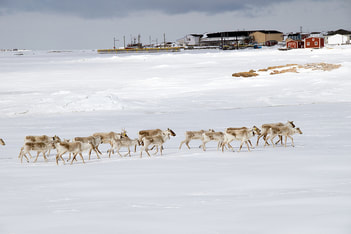Déline, Northwest Territories

Year(s) Funded: 2015-2016
Topic Area: Food Security Contact: Deborah Simmons, Sahtú Renewable Resources Board ([email protected]) Partners: Ɂehdzo Got’ı̨nę Gots’ę́ Nákedı (Sahtú Renewable Resources Board), Délı̨nę Ɂehdzo Got’ı̨nę (Renewable Resources Council), Centre for Sustainable Food Systems at Wilfrid Laurier University Website: http://www.srrb.nt.ca Title: Dene Nę́nę́ Gúlú gha Darade (Our Land is Changing): Climate Change, Food Security and Health in Délı̨nę
Action: The Bathurst and Bluenose East caribou herds that the community has historically relied on are declining; this has triggered a broad discussion about climate change, health and well-being, and food security in the community. This project aimed to 1) understand the role of country foods and the traditional practices in the daily lives of community members; 2) document changes in availability of country foods and threats to food security and 3) identify food security adaptation strategies that have been adopted in the past and possible strategies for the future. Climate change vulnerability and adaptation strategies were explored through a Community-Based and Participatory Action Research (PAR) methodology and used to engage with community members. This ensured that the research would be community driven and responsive to the needs of the community stakeholders. A workshop was held to establish the research questions at the intersection of climate change and access to country food that are important to the community. The community priorities from these workshops were the basis for semi-structured interviews/focus groups to be conducted with Elders, harvesters, women and youth. A workshop and a series of seasonal food security camps were held so that preliminary adaptation strategies can be further discussed and explored, ultimately resulting in an adaptation plan for the community. Results: The goal was to build capacity within the community to carry out adaption-based projects and promote community health and well-being in the new context of community self-government (inaugurated on September 1, 2016). Workshops enabled the community to determine research priorities, track progress and adapt methods on an ongoing basis extending beyond the life of this project. This adaptive management approach to the project contributed to the community’s capacity to adapt to current and future climate change impacts. By permission of the Délı̨nę community, project results are being disseminated through the annual Sahtú Environmental Research and Monitoring Forum, Cross-Cultural Research Camp and other regional forums, Facebook, and the popular media. Outputs:The case-study experience with Délı̨nę will be generalized into a model for conducting similar food security vulnerability assessments and planning exercises with a tool-kit that can be adapted for use by other communities. |
“We need to be out there, we need to harvest and we need to bring children out there, to tell them stories; when the children are on the Horn Plateau they wonder, ‘Why aren’t Dene living up here? It is such a beautiful place.’ In our traditional way, we are doing our own research, assessing whether the fish is a fat fish, a healthy fish. We do this in conjunction with contaminant researchers who can tell us if there is anything wrong in the system.” Grand Chief Herb Norwegian |
